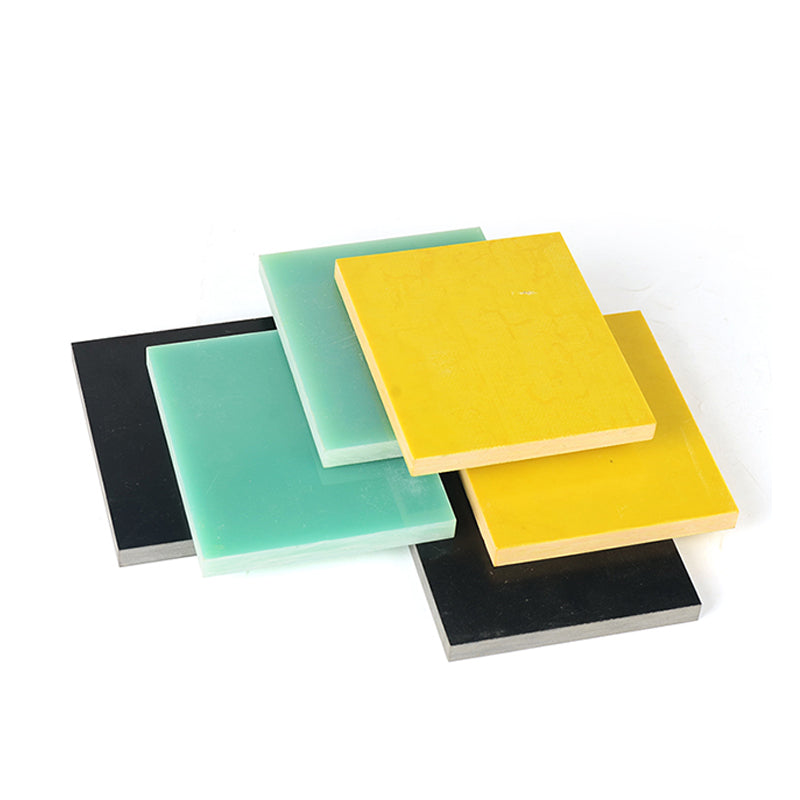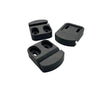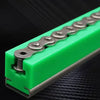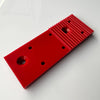Why PEEK Sheets Are Essential for Automotive and Transportation Industries
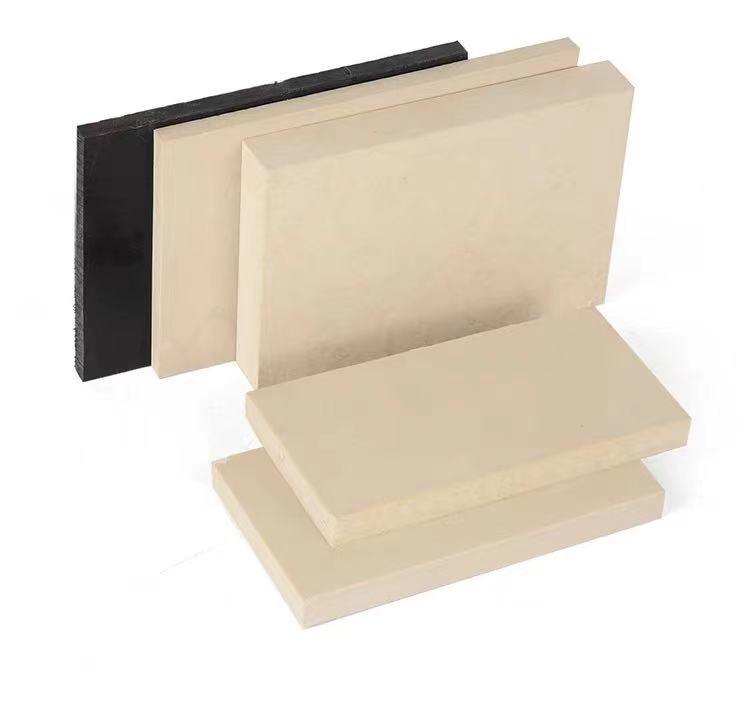
Synopsis: Why PEEK Sheets Are Essential for Automotive and Transportation Industries
Discover why PEEK sheets are revolutionizing the automotive and transportation sectors. This comprehensive guide explores the superior thermal stability of PEEK, making it ideal for high-temperature applications like engines and braking systems. Learn about PEEK’s mechanical strength and durability, which ensure reliability in load-bearing components such as gears and bearings.

Understand the benefits of PEEK's chemical resistance and longevity, crucial for components exposed to aggressive fluids in fuel systems and engine seals. Highlight the lightweight properties of PEEK sheets that contribute to fuel efficiency and reduced emissions by lowering vehicle weight.
Explore PEEK’s wear and friction resistance, perfect for high-wear applications including braking systems and transmission parts, reducing maintenance costs. See how PEEK is driving innovation in electric vehicles (EVs), providing excellent thermal management and weight reduction for battery insulation and electric motor components.
Finally, delve into the cost-effectiveness and processing advantages of PEEK, showcasing its ease of machining and molding, and how it can replace metals in many applications, offering a cost-effective solution without compromising performance.
By covering these key aspects, this blog post highlights why PEEK sheets are indispensable for modern automotive and transportation industries, ensuring high performance, reliability, and efficiency.
Superior Thermal Stability of PEEK Sheets
Exceptional Thermal Stability
PEEK sheets are renowned for their exceptional thermal stability, making them a superior choice for high-temperature applications in the automotive industry. These properties are critical in components such as automotive engines and braking systems, where maintaining performance at elevated temperatures is essential.
High Heat Deflection Temperature
One of the standout features of PEEK is its high heat deflection temperature (HDT). PEEK can withstand temperatures up to 260°C (500°F) without losing its mechanical integrity, which is significantly higher than many other polymers. This makes PEEK an ideal material for engine components and brake systems, which regularly operate under extreme thermal conditions.
Low Thermal Expansion
In addition to its high HDT, PEEK sheets exhibit a low coefficient of thermal expansion (CTE). This means that PEEK components will not expand or contract significantly with temperature changes, maintaining precise tolerances and reducing the risk of thermal deformation. This property is particularly beneficial in braking systems, where precise operation is critical for safety and performance.
Consistent Performance at Elevated Temperatures
PEEK maintains its mechanical strength even at high temperatures, unlike many traditional plastics that soften or degrade. For example, PEEK's tensile strength remains largely unaffected at temperatures up to 250°C, ensuring that components such as gears, bearings, and bushings continue to perform reliably under harsh conditions. This consistency in performance makes PEEK a preferred material for critical automotive applications where durability and reliability are paramount.
Resistance to Thermal Degradation
PEEK also resists thermal degradation, which is a common issue with many polymers when exposed to continuous high temperatures. This resistance extends the lifespan of PEEK components, reducing maintenance costs and downtime for automotive manufacturers. The stability of PEEK in high-temperature environments makes it ideal for use in engine management systems, where thermal stability directly impacts the efficiency and longevity.
By leveraging these exceptional thermal properties, PEEK sheets play a crucial role in enhancing the performance, reliability, and safety of automotive components, making them an indispensable material in the automotive industry.
Mechanical Strength and Durability
High Mechanical Strength
PEEK sheets are highly valued in the automotive industry for their exceptional mechanical strength. This robust material can withstand significant stress and maintain its integrity under heavy loads, making it ideal for load-bearing components in vehicles. The tensile strength of PEEK is impressive, ensuring that it can handle the demands of high-pressure environments without deforming or failing. This strength is particularly beneficial in transmission thrust washers, gears, and bearings, where reliability is paramount.

Durability in Harsh Conditions
PEEK exhibits outstanding durability, even in the harshest conditions. This includes resistance to high temperatures, which is critical for components exposed to the extreme heat of engines and braking systems. The material's ability to maintain its properties at elevated temperatures ensures that parts like gears and bearings remain functional and reliable, reducing the need for frequent replacements and maintenance.
Applications in Automotive Components
Transmission Thrust Washers
In the realm of transmission systems, PEEK thrust washers are favored for their ability to endure high loads and resist wear. These components benefit from PEEK's low coefficient of friction, which minimizes wear and tear and extends the lifespan of the washers. The material's inherent strength and durability ensure that the transmission system operates smoothly and efficiently.
Gears and Bearings
PEEK gears and bearings are integral to the performance of modern vehicles. The material's high wear resistance and low friction make it an excellent choice for these critical components. Gears made from PEEK can handle high rotational speeds and significant loads without degrading, ensuring long-lasting performance. Similarly, PEEK bearings offer superior durability and reduced maintenance needs, thanks to their ability to withstand constant motion and stress without significant wear (Aalborg Engineering).
Chemical and Wear Resistance
PEEK also boasts excellent chemical resistance, making it suitable for use in environments where exposure to various automotive fluids is common. This resistance extends to acids, alkalis, and organic chemicals, ensuring that PEEK components do not degrade when in contact with these substances. Additionally, PEEK's low wear rate contributes to its longevity, allowing components to maintain their performance over extended periods, even in challenging conditions.
Conclusion
The mechanical strength and durability of PEEK sheets make them indispensable in the automotive industry. Their ability to withstand high loads, resist wear, and perform reliably under extreme conditions ensures that components like transmission thrust washers, gears, and bearings deliver optimal performance. By leveraging these properties, PEEK enhances the reliability, efficiency, and longevity of automotive systems, making it a crucial material for modern vehicle design and manufacturing.

Chemical Resistance and Longevity
Outstanding Chemical Resistance
PEEK sheets exhibit outstanding chemical resistance, making them ideal for use in harsh automotive environments. Unlike many traditional plastics, PEEK can withstand exposure to a wide range of chemicals without degrading. This includes resistance to automotive fluids such as fuels, lubricants, coolants, and hydraulic fluids. The ability to resist chemical attack ensures that PEEK components maintain their integrity and performance over time, even when exposed to aggressive chemicals.
Applications in Fuel Systems
In fuel systems, PEEK is used extensively due to its exceptional resistance to fuel and its by-products. Components such as fuel pumps, fuel injectors, and fuel line connectors benefit from PEEK's stability in the presence of hydrocarbons and other fuel additives. PEEK's chemical resistance prevents swelling, cracking, or degradation, which can occur with other plastics, thereby enhancing the reliability and lifespan of fuel system components.
Engine Seals and Gaskets
PEEK is also widely used in engine seals and gaskets. These components are critical in preventing leaks and maintaining the pressure within the engine. PEEK's resistance to high temperatures and aggressive chemicals, such as oils and coolants, makes it an excellent material for cylinder head gaskets, valve seals, and O-rings. The use of PEEK in these applications ensures that the seals remain effective and durable, even under extreme operating conditions.
Additional Automotive Components
Beyond fuel systems and engine seals, PEEK is used in various other automotive components exposed to harsh environments. This includes parts like transmission components, braking systems, and electrical connectors. PEEK's ability to resist acids, bases, and organic solvents ensures that these parts maintain their performance and do not require frequent replacement or maintenance. This reliability is crucial for components that must endure the constant exposure to harsh chemicals and high temperatures typical in automotive applications.
Long-Term Performance and Cost Efficiency
The longevity of PEEK components translates to reduced maintenance costs and downtime for automotive manufacturers. By preventing chemical-induced wear and degradation, PEEK parts offer a longer service life compared to traditional materials. This durability not only enhances vehicle reliability but also contributes to overall cost savings in the long term. The chemical resistance of PEEK ensures that it remains a preferred choice for critical automotive applications, providing both performance and economic benefits.
By leveraging PEEK's chemical resistance and durability, automotive manufacturers can ensure that their components perform reliably under the most demanding conditions, making PEEK an invaluable material in modern automotive engineering.

Lightweight and Fuel Efficiency
Contribution to Weight Reduction
PEEK sheets are increasingly adopted in the automotive industry due to their lightweight nature, which significantly contributes to vehicle weight reduction. Reducing the weight of a vehicle is crucial for improving fuel efficiency and reducing emissions. PEEK, being lighter than metals such as steel and aluminum, allows manufacturers to replace heavier components without sacrificing strength and durability.
Enhanced Fuel Efficiency and Reduced Emissions
By utilizing PEEK in various automotive parts, manufacturers can achieve notable fuel efficiency improvements. A reduction in vehicle weight directly correlates to better fuel economy. For instance, replacing metal parts with PEEK can lead to a weight reduction of up to 60%, translating into a 6-8% improvement in fuel efficiency. This not only lowers fuel consumption but also helps in reducing greenhouse gas emissions, supporting global sustainability goals.
Applications in Engine Components
Engine Parts
PEEK is ideal for manufacturing critical engine components due to its high heat tolerance and resistance to wear. Components such as piston parts, pumps, clutches, and valve components benefit from PEEK's ability to maintain structural integrity and performance under extreme temperatures. The lightweight nature of PEEK also reduces the overall weight of these components, enhancing engine efficiency and performance.
Fuel System Components
In fuel systems, PEEK's chemical resistance makes it suitable for parts like fuel rails, fuel pump parts, and fuel line connectors. These components must withstand continuous exposure to hydrocarbons and other aggressive fluids without degrading. The lightweight properties of PEEK contribute to overall vehicle weight reduction, supporting improved fuel efficiency.
Structural Parts and Safety Components
Safety Components
PEEK's inherent strength and rigidity allow it to be used in critical safety components such as airbag housings and seat belt anchors. These parts require materials that can maintain their integrity under stress. PEEK's lightweight nature does not compromise on strength, ensuring safety while reducing vehicle weight.
Structural Integrity
PEEK is also used in structural parts like engine mounts and suspension components. These parts benefit from PEEK's vibration damping properties, which enhance durability and comfort. The reduced weight of these components further contributes to overall vehicle performance and fuel efficiency.
Bearings, Bushings, and Wear Parts
PEEK's low friction and high abrasion resistance make it suitable for bearings, bushings, and other wear parts. These components experience constant motion and stress, and PEEK’s properties help in reducing wear and maintenance costs. The lightweight nature of PEEK also helps in minimizing the weight of these parts, contributing to the vehicle's overall efficiency.
By integrating PEEK sheets into various automotive components, manufacturers can achieve significant weight savings, leading to improved fuel efficiency and reduced emissions. The versatility and performance benefits of PEEK make it an indispensable material in the quest for more efficient and sustainable vehicles.

Wear and Friction Resistance
Low Friction Properties
PEEK (Polyetheretherketone) is widely recognized for its low friction properties, making it an ideal material for applications where reducing friction is crucial. The low coefficient of friction in PEEK ensures minimal resistance between moving parts, which is particularly beneficial in automotive applications like braking systems and transmission parts. This characteristic reduces the wear on components, thereby enhancing their longevity and reliability.
High Wear Resistance
PEEK’s high wear resistance makes it suitable for high-wear applications, such as braking systems and transmission components. Its ability to withstand continuous mechanical stress without significant degradation ensures that PEEK components can endure the rigorous demands of automotive environments. For instance, PEEK is often used in brake wear sensors, transmission bushings, and power window gearings due to its durability and resistance to wear.
Applications in Braking Systems
In braking systems, PEEK components like brake wear sensors and brake cylinder components benefit from the material's low friction and high wear resistance. These properties ensure that the braking system operates smoothly and reliably, reducing the risk of failure and the need for frequent maintenance. The robustness of PEEK in these high-stress environments contributes to safer and more efficient vehicle operation.
Transmission Parts
PEEK is also extensively used in transmission parts. Components such as transmission thrust washers and gears are exposed to high rotational speeds and significant mechanical loads. The low friction and high wear resistance of PEEK help in maintaining the efficiency and reliability of the transmission system. By minimizing wear, PEEK reduces maintenance requirements and extends the lifespan of these critical components.
Reduction in Maintenance Costs
The use of PEEK in automotive applications leads to a significant reduction in maintenance costs. The material’s durability and resistance to wear mean that components need to be replaced less frequently, resulting in lower maintenance expenses and less downtime for vehicle repairs. This is particularly advantageous for parts that are difficult to access or replace, as it enhances overall vehicle reliability and operational efficiency.
Extending Component Lifespan
By utilizing PEEK’s superior wear and friction resistance, automotive manufacturers can extend the lifespan of various components. This not only improves the performance and safety of vehicles but also contributes to cost savings over the vehicle's lifecycle. PEEK’s ability to maintain its properties under high stress and temperature conditions ensures that it remains a reliable material for demanding automotive applications.
By integrating PEEK into automotive design, manufacturers can leverage its low friction and high wear resistance to produce more durable, efficient, and cost-effective vehicles. These properties make PEEK an invaluable material in enhancing the performance and reliability of modern automotive systems.
Applications in Electric Vehicles (EVs)
Role in Battery Insulation
PEEK sheets play a crucial role in the battery insulation of electric vehicles (EVs). The high dielectric strength of PEEK ensures effective insulation of battery packs, preventing electrical arcing and thermal runaway, which are critical safety concerns in high-voltage battery systems. PEEK’s superior thermal stability and resistance to aggressive chemicals make it ideal for maintaining the integrity of battery cells, even under extreme conditions. This enhances the overall safety and longevity of EV battery systems, supporting the move towards higher voltage batteries (up to 800V) that offer faster charging and greater efficiency.
Use in Electric Motor Components
PEEK is extensively used in electric motor components due to its excellent thermal conductivity and mechanical strength. Components such as magnet wire insulation and slot liners benefit from PEEK’s ability to manage heat effectively, which is essential for maintaining motor efficiency and reliability. The use of PEEK in these applications helps in increasing the power density of motors by allowing for higher copper content and improved thermal management. This leads to enhanced motor performance, reduced weight, and extended operational life, which are vital for the demanding requirements of electric vehicle motors.
High-Voltage Connectors
High-voltage connectors in EVs also leverage PEEK’s exceptional properties. These connectors need to ensure safe and reliable transmission of high-voltage currents while minimizing the risk of electrical faults. PEEK’s high dielectric strength and chemical resistance make it ideal for high-voltage interlock (HVIL) systems, which are critical for the safety of electric vehicles. HVIL connectors using PEEK ensure that high-voltage circuits are safely isolated during maintenance or in case of accidents, thereby protecting both the vehicle and its occupants.
Benefits of Thermal Management
PEEK’s high thermal conductivity significantly improves the thermal management of electric vehicle components. Effective thermal management is essential to prevent overheating and ensure the efficient operation of EV systems. PEEK’s ability to dissipate heat efficiently helps maintain optimal operating temperatures for battery packs and electric motors, thereby enhancing performance and reliability. Improved thermal management also contributes to the overall efficiency and safety of electric vehicles, making PEEK an indispensable material in modern EV design.
Weight Reduction in EVs
The lightweight nature of PEEK is another critical advantage in electric vehicles. Reducing the weight of components like battery insulation, motor parts, and connectors helps in improving the overall efficiency and range of EVs. Lighter vehicles require less energy to operate, which translates to longer driving ranges and better fuel efficiency. By replacing heavier materials with PEEK, automotive manufacturers can achieve significant weight savings without compromising on performance or safety, supporting the development of more efficient and environmentally friendly electric vehicles.
By incorporating PEEK sheets into various components of electric vehicles, manufacturers can leverage its unique properties to enhance the performance, safety, and efficiency of EVs, driving the future of sustainable transportation.

Cost-Effectiveness and Processing Advantages
Cost Benefits in Automotive Manufacturing
PEEK sheets offer significant cost benefits in automotive manufacturing. One of the primary advantages is their ability to replace traditional metal components, which are often heavier and more expensive to produce. PEEK provides a cost-effective alternative without compromising on performance, making it an attractive option for manufacturers looking to optimize production costs. The initial material cost of PEEK can be higher than some metals, but the overall savings come from reduced machining, lower weight, and enhanced durability.
Ease of Machining and Molding
PEEK’s ease of machining and molding is another critical factor contributing to its cost-effectiveness. PEEK can be easily machined into complex shapes with high precision, reducing the need for additional processing steps. This ease of fabrication allows manufacturers to produce intricate components more efficiently, saving time and labor costs. Additionally, PEEK can be injection molded, which is a cost-effective method for mass production of parts. This versatility in processing methods makes PEEK suitable for a wide range of automotive applications, from small gears to large structural components.
Replacing Metals with PEEK
PEEK’s ability to replace metals in many applications offers substantial cost savings. Metals like steel and aluminum are traditionally used for their strength and durability, but they are also heavier and require more energy-intensive processing. PEEK, on the other hand, provides similar or superior mechanical properties while being much lighter. This weight reduction translates to improved fuel efficiency and lower emissions, further enhancing the cost benefits. For example, replacing metal gears and bearings with PEEK components not only reduces weight but also lowers wear and maintenance costs due to PEEK’s high wear resistance and low friction properties.
Performance without Compromise
Despite being more cost-effective, PEEK does not compromise on performance. It maintains excellent mechanical properties even at high temperatures and in chemically aggressive environments. This makes PEEK ideal for use in demanding automotive applications such as engine components, transmission parts, and braking systems. The durability and reliability of PEEK ensure that the components have a long service life, which reduces the frequency and cost of replacements. This performance consistency is crucial for automotive manufacturers aiming to produce high-quality, reliable vehicles.
Additional Processing Advantages
Beyond cost and performance, PEEK offers several additional processing advantages. Its high thermal stability allows it to withstand the heat generated during machining and molding processes without degrading. PEEK also has excellent dimensional stability, ensuring that components remain precise and functional even after processing. These properties make PEEK a versatile and efficient material for a wide range of automotive applications, further contributing to its cost-effectiveness in manufacturing.
By leveraging the cost benefits and processing advantages of PEEK sheets, automotive manufacturers can produce high-performance, durable, and lightweight components more efficiently. This not only reduces production costs but also enhances the overall quality and performance of the vehicles, making PEEK an indispensable material in modern automotive manufacturing.

Frequently Asked Questions (FAQ) about PEEK Sheets and Beeplastics Customization
1. What are the primary applications of PEEK sheets in the automotive industry?
Answer: PEEK sheets are used extensively in the automotive industry due to their excellent thermal stability, mechanical strength, and chemical resistance. Common applications include engine components, transmission parts, and braking systems. PEEK is also used in fuel system components, electric motor parts, and high-voltage connectors due to its superior properties.
2. How does the use of PEEK sheets improve fuel efficiency in vehicles?
Answer: The lightweight nature of PEEK sheets contributes to significant weight reduction in vehicles. By replacing heavier metal components with PEEK, vehicles become lighter, which directly improves fuel efficiency and reduces emissions. This is crucial for enhancing the overall performance and sustainability of modern vehicles.
3. What makes PEEK sheets suitable for high-wear automotive applications?
Answer: PEEK sheets exhibit low friction and high wear resistance, making them ideal for high-wear applications such as braking systems and transmission parts. These properties reduce maintenance costs and extend the lifespan of automotive components, ensuring reliable performance under demanding conditions.
4. Can PEEK sheets replace metals in automotive manufacturing without compromising performance?
Answer: Yes, PEEK sheets can effectively replace metals in many automotive applications. They offer similar or superior mechanical properties while being much lighter. This replacement results in cost savings, improved fuel efficiency, and enhanced performance without compromising the durability and reliability of the components.
5. What are the customization options available at Beeplastics?
Answer: Beeplastics offers extensive customization options, including sample customization and batch customization. We can tailor PEEK sheets and other plastic components to meet specific requirements, ensuring they fit perfectly within your application.
6. What file formats does Beeplastics accept for customization orders?
Answer: Beeplastics accepts a variety of file formats for customization orders, including PDF and CAD files. This flexibility allows us to work with detailed designs and specifications, ensuring the final product meets your exact needs.
7. Is there a minimum order quantity (MOQ) for customized orders at Beeplastics?
Answer: No, there is no minimum MOQ for customized orders at Beeplastics. We cater to both small and large orders, providing flexibility for customers with varying needs.
8. How is the production cycle determined for customized orders at Beeplastics?
Answer: The production cycle at Beeplastics is determined based on the order quantity and the complexity of the process. We communicate the production progress in real-time, ensuring transparency and timely delivery.
9. Does Beeplastics provide samples of customized products?
Answer: Yes, Beeplastics supports the provision of samples. Customers are responsible only for the shipping costs, and the sample itself is provided free of charge. This allows you to evaluate the product before placing a larger order.
10. What are the cost benefits of using PEEK sheets in automotive manufacturing?
Answer: Using PEEK sheets in automotive manufacturing offers several cost benefits. PEEK’s ease of machining and molding reduces production costs, while its ability to replace metals without compromising performance leads to significant cost savings. Additionally, the durability and reduced maintenance costs associated with PEEK components contribute to overall economic efficiency.
These FAQs provide a comprehensive overview of the advantages and customization options associated with PEEK sheets and the services offered by Beeplastics. For more detailed information or specific inquiries, please contact Beeplastics directly.
PEEK sheets are revolutionizing the automotive industry with their superior thermal stability, mechanical strength, and chemical resistance. Their lightweight nature enhances fuel efficiency and reduces emissions, while their low friction and high wear resistance ensure durability and reliability in high-stress applications like braking systems and transmission parts. The cost-effectiveness of PEEK, combined with its ease of machining and molding, makes it an invaluable material for automotive manufacturers. By adopting PEEK, the industry can achieve significant improvements in performance, sustainability, and economic efficiency, paving the way for the future of automotive innovation.

Ready to enhance your automotive components with the superior performance of PEEK sheets? Fill out our contact form below to get started on your customization order today. For more detailed information on PEEK and its applications, visit our dedicated page here.
-
Posted in
automotive, efficiency, maintenance, peek sheets, productivity, repair, transportation

